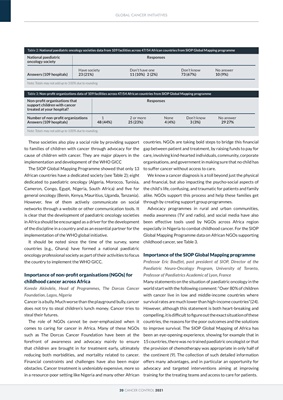
GLOBAL CANCER INITIATIVES
20 CANCER CONTROL 2021
countries. NGOs are taking bold steps to bridge this financial
gap between patient and treatment, by raising funds to pay for
care, involving kind-hearted individuals, community, corporate
organisations, and government in making sure that no child has
to suffer cancer without access to care.
We know a cancer diagnosis is a toll beyond just the physical
and financial, but also impacting the psycho-social aspects of
the child's life, confusing, and traumatic for patients and family
alike. NGOs support this process and help these families get
through by creating support group programmes.
Advocacy programmes in rural and urban communities,
media awareness (TV and radio), and social media have also
been effective tools used by NGOs across Africa region
especially in Nigeria to combat childhood cancer. For the SIOP
Global Mapping Programme data on African NGOs supporting
childhood cancer, see Table 3.
Importance of the SIOP Global Mapping programme
Professor Eric Bouffet, past president of SIOP, Director of the
Paediatric Neuro-Oncology Program, University of Toronto,
Professor of Paediatrics Academic of Lyon, France
Many statements on the situation of paediatric oncology in the
world start with the following comment: "Over 80% of children
with cancer live in low and middle-income countries where
survival rates are much lower than high-income countries"(24).
However, although this statement is both heart-breaking and
compelling, it is difficult to figure out the exact situation of these
countries, the reasons for the poor outcomes and the solutions
to improve survival. The SIOP Global Mapping of Africa has
been an eye-opening experience, showing for example that in
15 countries, there was no trained paediatric oncologist or that
the provision of chemotherapy was appropriate in only half of
the continent (9). The collection of such detailed information
offers many advantages, and in particular an opportunity for
advocacy and targeted interventions aiming at improving
training for the treating teams and access to care for patients.
These societies also play a social role by providing support
to families of children with cancer through advocacy for the
cause of children with cancer. They are major players in the
implementation and development of the WHO GICC
The SIOP Global Mapping Programme showed that only 13
African countries have a dedicated society (see Table 2); eight
dedicated to paediatric oncology (Algeria, Morocco, Tunisia,
Cameron, Congo, Egypt, Nigeria, South Africa) and five for
general oncology (Benin, Kenya, Mauritius, Uganda, Tanzania).
However, few of them actively communicate on social
networks through a website or other communication tools. It
is clear that the development of paediatric oncology societies
in Africa should be encouraged as a driver for the development
of the discipline in a country and as an essential partner for the
implementation of the WHO global initiative.
It should be noted since the time of the survey, some
countries (e.g., Ghana) have formed a national paediatric
oncology professional society as part of their activities to focus
the country to implement the WHO GICC.
Importance of non-profit organisations (NGOs) for
childhood cancer across Africa
Korede Akindele, Head of Programmes, The Dorcas Cancer
Foundation, Lagos, Nigeria
Cancer is a bully. Much worse than the playground bully, cancer
does not try to steal children's lunch money. Cancer tries to
steal their futures.
The role of NGOs cannot be over-emphasized when it
comes to caring for cancer in Africa. Many of these NGOs
such as The Dorcas Cancer Foundation have been at the
forefront of awareness and advocacy mainly to ensure
that children are brought in for treatment early, ultimately
reducing both morbidities, and mortality related to cancer.
Financial constraints and challenges have also been major
obstacles. Cancer treatment is undeniably expensive, more so
in a resource-poor setting like Nigeria and many other African
Table 2: National paediatric oncology societies data from 109 facilities across 47/54 African countries from SIOP Global Mapping programme
National paediatric Responses
oncology society
Have society Don't have one Don't know No answer
Answers (109 hospitals) 23 (21%) 11 (10%) 2 (2%) 73 (67%) 10 (9%)
Note: Totals may not add up to 100% due to rounding.
Table 3: Non-profit organizations data of 109 facilities across 47/54 African countries from SIOP Global Mapping programme
Non-profit organisations that Responses
support children with cancer
treated at your hospital?
Number of non-profit organizations 1 2 or more None Don't know No answer
Answers (109 hospitals) 48 (44%) 25 (23%) 4 (4%) 3 (3%) 29 27%
Note: Totals may not add up to 100% due to rounding.